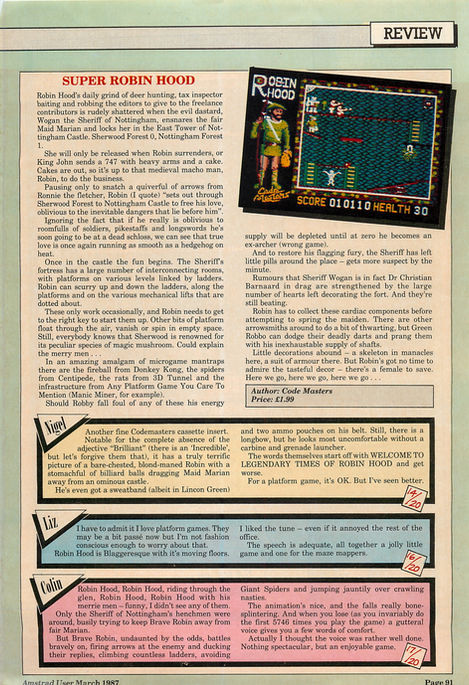November '86


Other formats with Robin Hood:Legend Quest




Spectrum
C64
"In this incredible platform game you play the role of Robin Hood and must rescue Maid Marion who has been locked away by the Sheriff of Nottingham. Robin must fight his way past the guards and medieval animals protecting the castle. Only by fast reflexes and accurate manoeuvring do you stand a chance of rescuing Maid Marian."
What the press said
The Map of the Amstrad Version
After completing Killapede we took our A levels in the May of ‘86. Our parents wanted us to go to university, but we really didn't want to since there weren't any courses on video game development or relevant programming languages or anything to do with computer graphics. Helped by our Head of Sixth Form we were able to convince our parents that we could take a year out to develop games and see if we could make a business of it.
We designed and started coding a very ambitious game called Excalibar inspired by Atari’s Gauntlet, but this was more of a top-down adventure game where the player had to explore and find treasures in a mediaeval world. We pitched the idea to Firebird and they agreed to £10,000 for three versions - Amstrad, Spectrum and Commodore 64. Given their past performance we weren’t prepared to continue until a contract turned up and so decided to pitch a new game to other publishers at ECTS in the first week of September ‘86 in London.
We decided on Robin Hood since we felt players would instantly recognise the name and like the idea of playing a hero archer raiding a castle. ’Super’ was added to make it feel more special!
We pitched this to a new publisher called Codemasters, from a single A4 piece of handwritten paper and asked how much they’d pay us for this game on an Amstrad CPC. Co-founder David Darling said £10,000 at which we said we’d do it and return it to them asap.
We worked very long hours with the single Amstrad CPC which was on 23 hours a day, (2 half-hour breaks for cooling), and developed the game within a month and took it back to Codemasters. They agreed to publish the game, but sadly £10,000 turned out to be an estimate of royalties. Instead, they’d pay 10p per copy sold. We were clearly disappointed, but they agreed that if we signed a publishing deal with them that day, that they’d advance us £2,000 immediately. We agreed as this was significantly more than Killapede and we hoped it would sell well.
The game was a massive success and royalties exceeded £10,000 and this became the start of a long, and very rewarding relationship.























